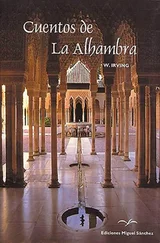Washington Irving - The Alhambra
Здесь есть возможность читать онлайн «Washington Irving - The Alhambra» — ознакомительный отрывок электронной книги совершенно бесплатно, а после прочтения отрывка купить полную версию. В некоторых случаях можно слушать аудио, скачать через торрент в формате fb2 и присутствует краткое содержание. Жанр: unrecognised, на английском языке. Описание произведения, (предисловие) а так же отзывы посетителей доступны на портале библиотеки ЛибКат.
- Название:The Alhambra
- Автор:
- Жанр:
- Год:неизвестен
- ISBN:нет данных
- Рейтинг книги:5 / 5. Голосов: 1
-
Избранное:Добавить в избранное
- Отзывы:
-
Ваша оценка:
- 100
- 1
- 2
- 3
- 4
- 5
The Alhambra: краткое содержание, описание и аннотация
Предлагаем к чтению аннотацию, описание, краткое содержание или предисловие (зависит от того, что написал сам автор книги «The Alhambra»). Если вы не нашли необходимую информацию о книге — напишите в комментариях, мы постараемся отыскать её.
The Alhambra — читать онлайн ознакомительный отрывок
Ниже представлен текст книги, разбитый по страницам. Система сохранения места последней прочитанной страницы, позволяет с удобством читать онлайн бесплатно книгу «The Alhambra», без необходимости каждый раз заново искать на чём Вы остановились. Поставьте закладку, и сможете в любой момент перейти на страницу, на которой закончили чтение.
Интервал:
Закладка:
En frente del toro
Se hallen tesoro.
(In front of the bull there is treasure.) Many digged in front of the fountain, but lost their labor and found no money. At last one knowing fellow construed the motto a different way. It is in the forehead (frente) of the bull that the treasure is to be found, said he to himself, and I am the man to find it. Accordingly he came, late at night, with a mallet, and knocked the head to pieces; and what do you think he found?
“Plenty of gold and diamonds!” cried Sancho eagerly.
“He found nothing,” rejoined mine host, dryly, “and he ruined the fountain.”
Here a great laugh was set up by the landlord’s hangers-on; who considered Sancho completely taken in by what I presume was one of mine host’s standing jokes.
Leaving Antiquera at eight o’clock, we had a delightful ride along the little river, and by gardens and orchards fragrant with the odors of spring and vocal with the nightingale. Our road passed round the Rock of the Lovers (el peñon de los enamorados), which rose in a precipice above us. In the course of the morning we passed through Archidona, situated in the breast of a high hill, with a three-pointed mountain towering above it, and the ruins of a Moorish fortress. It was a great toil to ascend a steep stony street leading up into the city, although it bore the encouraging name of Calle Real del Llano (the royal street of the plain), but it was still a greater toil to descend from this mountain city on the other side.
At noon we halted in sight of Archidona, in a pleasant little meadow among hills covered with olive-trees. Our cloaks were spread on the grass, under an elm by the side of a bubbling rivulet; our horses were tethered where they might crop the herbage, and Sancho was told to produce his alforjas. He had been unusually silent this morning ever since the laugh raised at his expense, but now his countenance brightened, and he produced his alforjas with an air of triumph. They contained the contributions of four days’ journeying, but had been signally enriched by the foraging of the previous evening in the plenteous inn at Antiquera; and this seemed to furnish him with a set-off to the banter of mine host.
En frente del toro
Se hallen tesoro
would he exclaim, with a chuckling laugh, as he drew forth the heterogeneous contents one by one, in a series which seemed to have no end. First came forth a shoulder of roasted kid, very little the worse for wear; then an entire partridge; then a great morsel of salted codfish wrapped in paper; then the residue of a ham; then the half of a pullet, together with several rolls of bread, and a rabble rout of oranges, figs, raisins, and walnuts. His bota also had been recruited with some excellent wine of Malaga. At every fresh apparition from his larder, he would enjoy our ludicrous surprise, throwing himself back on the grass, shouting with laughter, and exclaiming, “Frente del toro!—frente del toro! Ah, Señors, they thought Sancho a simpleton at Antiquera; but Sancho knew where to find the tesoro .”
While we were diverting ourselves with his simple drollery, a solitary beggar approached, who had almost the look of a pilgrim. He had a venerable gray beard, and was evidently very old, supporting himself on a staff, yet age had not bowed him down; he was tall and erect, and had the wreck of a fine form. He wore a round Andalusian hat, a sheep-skin jacket, and leathern breeches, gaiters, and sandals. His dress, though old and patched, was decent, his demeanor manly, and he addressed us with the grave courtesy that is to be remarked in the lowest Spaniard. We were in a favorable mood for such a visitor; and in a freak of capricious charity gave him some silver, a loaf of fine wheaten bread, and a goblet of our choice wine of Malaga. He received them thankfully, but without any grovelling tribute of gratitude. Tasting the wine, he held it up to the light, with a slight beam of surprise in his eye; then quaffing it off at a draught, “It is many years,” said he, “since I have tasted such wine. It is a cordial to an old man’s heart.” Then, looking at the beautiful wheaten loaf, “ bendito sea tal pan! ” “blessed be such bread!” So saying, he put it in his wallet. We urged him to eat it on the spot. “No, Señors,” replied he, “the wine I had either to drink or leave; but the bread I may take home to share with my family.”
Our man Sancho sought our eye, and reading permission there, gave the old man some of the ample fragments of our repast, on condition, however, that he should sit down and make a meal.
He accordingly took his seat at some little distance from us, and began to eat slowly, and with a sobriety and decorum that would have become a hidalgo. There was altogether a measured manner and a quiet self-possession about the old man, that made me think that he had seen better days: his language too, though simple, had occasionally something picturesque and almost poetical in the phraseology. I set him down for some broken-down cavalier. I was mistaken; it was nothing but the innate courtesy of a Spaniard, and the poetical turn of thought and language often to be found in the lowest classes of this clear-witted people. For fifty years, he told us, he had been a shepherd, but now he was out of employ and destitute. “When I was a young man,” said he, “nothing could harm or trouble me; I was always well, always gay; but now I am seventy-nine years of age, and a beggar, and my heart begins to fail me.”
Still he was not a regular mendicant: it was not until recently that want had driven him to this degradation; and he gave a touching picture of the struggle between hunger and pride, when abject destitution first came upon him. He was returning from Malaga without money; he had not tasted food for some time, and was crossing one of the great plains of Spain, where there were but few habitations. When almost dead with hunger, he applied at the door of a venta or country inn. “ Perdón usted por Dios hermano! ” (Excuse us, brother, for God’s sake!) was the reply—the usual mode in Spain of refusing a beggar. “I turned away,” said he, “with shame greater than my hunger, for my heart was yet too proud. I came to a river with high banks, and deep, rapid current, and felt tempted to throw myself in: ‘What should such an old, worthless, wretched man as I live for?’ But when I was on the brink of the current, I thought on the blessed Virgin, and turned away. I travelled on until I saw a country-seat at a little distance from the road, and entered the outer gate of the court-yard. The door was shut, but there were two young señoras at a window. I approached and begged;—‘ Perdón usted por Dios hermano! ’—and the window closed. I crept out of the court-yard, but hunger overcame me, and my heart gave way: I thought my hour at hand, so I laid myself down at the gate, commended myself to the Holy Virgin, and covered my head to die. In a little while afterwards the master of the house came home: seeing me lying at his gate, he uncovered my head, had pity on my gray hairs, took me into his house, and gave me food. So, Señors, you see that one should always put confidence in the protection of the Virgin.”
The old man was on his way to his native place, Archidona, which was in full view on its steep and rugged mountain. He pointed to the ruins of its castle. “That castle,” he said, “was inhabited by a Moorish king at the time of the wars of Granada. Queen Isabella invaded it with a great army; but the king looked down from his castle among the clouds, and laughed her to scorn! Upon this the Virgin appeared to the queen, and guided her and her army up a mysterious path in the mountains, which had never before been known. When the Moor saw her coming, he was astonished, and springing with his horse from a precipice, was dashed to pieces! The marks of his horse’s hoofs,” said the old man, “are to be seen in the margin of the rock to this day. And see, Señors, yonder is the road by which the queen and her army mounted: you see it like a ribbon up the mountain’s side; but the miracle is, that, though it can be seen at a distance, when you come near it disappears!”
Читать дальшеИнтервал:
Закладка:
Похожие книги на «The Alhambra»
Представляем Вашему вниманию похожие книги на «The Alhambra» списком для выбора. Мы отобрали схожую по названию и смыслу литературу в надежде предоставить читателям больше вариантов отыскать новые, интересные, ещё непрочитанные произведения.
Обсуждение, отзывы о книге «The Alhambra» и просто собственные мнения читателей. Оставьте ваши комментарии, напишите, что Вы думаете о произведении, его смысле или главных героях. Укажите что конкретно понравилось, а что нет, и почему Вы так считаете.












